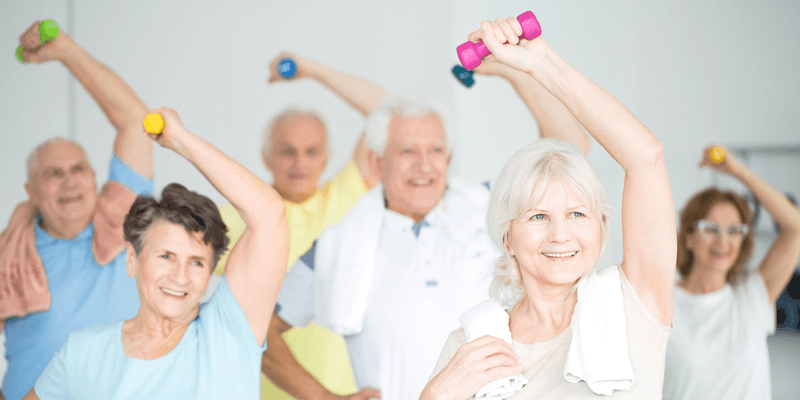Osteoporosis can develop from several risk factors, such as family history and genetics to diet and nutrition, but does lack of calcium cause osteoporosis? Osteoporosis means “porous bone.” The texture of a healthy bone should be similar to a honeycomb under a microscope. When osteoporosis develops, the holes in the honeycomb become much wider as the bone loses density. Less dense bones are weaker and fracture more easily.
Read on to discover if a lack of calcium does cause osteoporosis or if other factors contribute more!
Osteoporosis in Seniors
Roughly 54 million Americans have osteoporosis. The condition is more prevalent in women, typically affecting 1 in 4 women over 65 years compared to the average 1 in 20 men of the same age. Since you cannot feel your bones weakening, osteoporosis can be present for a long time without making itself known. You may not realize you have it until you break a bone.
Osteoporosis can be diagnosed with a bone density test, which entails a short scan of the entire skeletal system (much like a full-body x-ray). A specialist machine called a DXA measures the density in the bones. Bone density tests for seniors osteoporosis are noninvasive and painless. You can remain fully or partially clothed, and it usually takes about 15 minutes. If diagnosed, one of our health tips for seniors is to repeat the test every 2 years.
Preventative Health Care for Seniors
Osteoporosis in seniors is more common than in younger groups. Experts recommend preventative health care for seniors, including a bone density test for anyone over 65 (particularly women). Women under 65 who have gone through menopause and individuals over 50 who break a bone should talk to their doctor about getting checked for osteoporosis.
Osteoporosis tends to result in fractures in the hip, knee, or ankle. Among other risk factors, senior osteoporosis is more common in individuals who have experienced:
- Breast cancer
- Prostate cancer
- Weight loss surgery
- Lupus
- Eating disorders
- Sickle cell disease
- Kidney disease
- Diabetes
- HIV
- Spinal cord injuries
Health Tips for Seniors: Eating for Healthy Bones
Bone health begins in childhood, but eating for healthy bones is critical for preventative health care for seniors. Diet is a key component in bone health care; calcium is essential to maintaining optimal bone density. Depending on age, both men and women should get 1,000-1,200mg of calcium each day.
Foods high in calcium include leafy greens, calcium-fortified foods, dairy products, and soft-boned fish such as:
- Milk
- Yogurt
- Cheese
- Salmon
- Spinach
- Beans
- Sardines
- Kale
- Figs
- Crab
Vitamins D and C are also vital to bone health. Vitamin D is necessary for your body to absorb any calcium you intake. Make sure to eat plenty of fresh fruit, almonds, orange juice, and fish. As a rule of thumb, a healthy plate is composed of a variety of colors. For example, green kale, pink salmon, an orange, and a cup of yogurt make a plate of four colors with plenty of essential nutrients.
Calcium supplements can also help you keep the appropriate levels of calcium in your body. These are available over the counter in drug stores and supermarkets. Take calcium with food to ensure maximum absorption. Talk to your doctor or pharmacist about the best supplements for you.
Does a Lack of Calcium Cause Osteoporosis?
In tandem with other risk factors, a lack of calcium does cause osteoporosis — or at least it can lead to the development of osteoporosis in seniors. This is exactly what makes calcium so essential to your diet. Vegan diets can be lacking in calcium because of the limited dairy and fish intake. However, as long as fresh vegetables are consumed regularly and any insufficiencies are made up for with supplements, a vegan diet can still be healthy.
Senior Care in Central Arkansas
The weak bones caused by osteoporosis can make you feel like you are losing independence. As bones become more brittle and break more easily, mobility can be limited. A broken bone can leave you homebound for weeks, making you dependent on other people to provide food and do housework. Limited independence can also take a toll on your mental health. Follow health tips for seniors to ensure you eat and act to prevent or control osteoporosis in seniors.
Fitness Center
More activity might seem counterproductive, but attending fitness classes can make a big difference to your physical health. Stronger muscles make falling and breaking a bone probable. Even gentle exercise can strengthen muscles. If you are looking for activity-based senior care in Central Arkansas, our wellness centers develop fitness plans with senior health — and problems like seniors osteoporosis — in mind.

Active Older People
If you need help with other aspects of your life, such as reminders to take medication or supplements, our Central Arkansas senior care encompasses that, too. CareLink’s services are tailored to fit your needs. Medications and transportation to doctor appointments are two of the many services we offer active seniors in Central Arkansas.
Homebound Older People
If your mobility is limited or you have broken a bone because of senior osteoporosis, we also offer services for homebound older people in Central Arkansas. Our home services include cooking and cleaning, personal care like showering, and social care. We can also help with medications and transport services. One of our most successful services is our Meals On Wheels program. This program enables you to access delicious, nutritious meals — straight to your doorstep, hot or not.
For More Information
When you know a lack of calcium does cause osteoporosis, you can enact preventative measures to keep bones healthy. CareLink is here, whether you are concerned about senior osteoporosis or just need a little extra help to maintain your independence.
Fill out our online form to get in touch with us today. Our friendly team will complete a thorough assessment of your loved one’s situation, needs, as well as preferences, and create a list of options to choose from.
